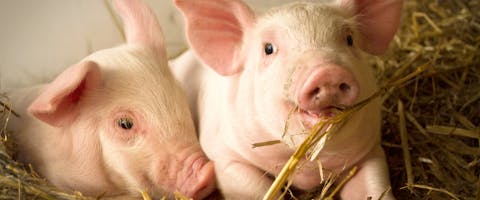Old McDonald had a farm but had a two-week vacation booked in April so needed to find a farm sitter. Luckily, Old McDonald is a TrustedHousesitters member, so he can easily find some farm animal care from one of our pet-loving sitters! Although we love to talk about our many cat and dog friends, we also have a great variety of other pets.
Have you ever fancied pet-sitting farm animals? Do you have previous experience with horse pet sitting, rounding up hens, or caring for other outdoor animals? Perhaps you’re keen to learn more about an animal farmyard and stretch your barn legs a bit more? Whatever you’re sitting situation, it’s good to be as prepared as possible pet sitting farm animals. Here are some key farmyard facts to help with farm animal pet sitting.
Trending posts
Purr-use some of the top blogs our members have been loving this month- Top male dog names for your new furry friendGot a new furry family member in your pack? Check…

- Top female dog names for your new fluffy palWelcoming a new pooch into your family? Explore…

- 120+ gray cat names your silver feline will loveRecently welcomed a fluffy gray bundle of joy into…

- What are normal pet sitting rates?Discover the average pet sitting rates for animals…

- Unique dog names to stand out from the packDare to be different with our list of the best…

1. Know your animals
Sometimes stating the obvious is necessary. If you’re looking to provide animal care whilst farm sitting it’s important to know exactly what you’re signing up for - the last thing you want is to presume you’re spending a few weeks with a couple of donkeys, only to find out there’s also a herd of cows and barn full of goats. Well, maybe that’s a bit dramatic, but you know what we mean!
Try to visit the farm before your scheduled sit. This way, you can meet the animals, run through their routines, ask as many questions in person as possible, and generally understand the layout of the farmyard. Larger farms may include outside help, so if you’re able to meet the farmhands too, that could also be very helpful.
If you’re not able to make an in-person visit before your sit, make sure you’ve asked as many questions as possible about farm animal care, and security, and you’ve talked to the owners on several separate occasions. Ask them to leave you a list of instructions alongside their emergency contact and vet details.
2. You must be able to stick to a strict routine
So, so important! Even the smallest hobby animal farms need to stick to a strict routine of feeding, cleaning, and grooming. Not only will this keep the animals cared for, but it will also help keep them safe. A constant human presence keeps away potential predators, particularly if you’re caring for poultry or waterfowl.
You don’t need to be marching around the farm 24/7, but be sure to incorporate a few additional checks throughout the day to make sure everyone’s happy and safe.
3. Farm care requires more than meal times
Similar to the point above, farming animals can’t be fed and left. Many of them need some TLC time too. Aw! Herd animals - cows, sheep, goats, horses - also benefit from gentle human interactions. Not only will this help the animals to familiarize themselves with you, but it’ll keep them calmer during feeding and grooming times.
Most farm animals will be let out into a pen or field for exercise each day. You can use this time to simply watch them so they can become used to your presence. As well as keeping the animals calm, this will also keep you safe too.
4. Keeping the animals safe
Not all farm animals are as pocket-sized as piglets, some of them are big and very strong. Many farm families will require their sitters to have some larger animal handling experience beforehand. If you’re a keen bean and desperate to muck out a stable or two, make sure you have some farm volunteering under your belt. Otherwise, there are loads of farm animal care courses that can be done locally and in a short amount of time.
Make sure you run through any safety procedures before the pet parents leave and ask them the best call of action in the case of an emergency. Checking gates and stable doors is also vital - you don’t want to be in the situation of running around trying to round up 15 different animals.
5. Keep yourself safe
Your safety is just as important as the animal care. If you ever feel unsafe or scared by a situation - especially with larger animals like horses and pigs - remove yourself from the area and contact the pet parents immediately. Never put yourself at risk in a scenario that frightens you. If anything should happen, be sure to call for help straight away.
Remember, always contact a vet if you’re ever concerned or unsure about your furry friends. Our Standard and Premium members have free access to our 24/7 vet advice who are there to help with any type of creature. Not a member yet? What not take a look at our current house sits and see if there’s a farm family in need of a sitter?

